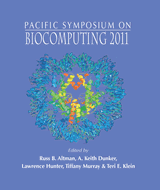Matching Cancer Genomes to Established Cell Lines for Personalized Oncology
Joel T. Dudley1,2,3, Rong Chen2,3, Atul J. Butte2,3,*
1Training Program in Biomedical Informatics and 2Department of Pediatrics, Stanford University School of Medicine Stanford, CA 94305, USA; 3Luclie Packard Children’s Hospital, Palo Alto, CA 94304, USA
Pacific Symposium on Biocomputing 16:243-252(2011)

Abstract
The diagnosis and treatment of cancers, which rank among the leading causes of mortality in developed nations, presents substantial clinical challenges. The genetic and epigenetic heterogeneity of tumors can lead to differential response to therapy and gross disparities in patient outcomes, even for tumors originating from similar tissues. High-throughput DNA sequencing technologies hold promise to improve the diagnosis and treatment of cancers through efficient and economical profiling of complete tumor genomes, paving the way for approaches to personalized oncology that consider the unique genetic composition of the patient's tumor. Here we present a novel method to leverage the information provided by cancer genome sequencing to match an individual tumor genome with commercial cell lines, which might be leveraged as clinical surrogates to inform prognosis or therapeutic strategy. We evaluate the method using a published lung cancer genome and genetic profiles of commercial cancer cell lines. The results support the general plausibility of this matching approach, thereby offering a first step in translational bioinformatics approaches to personalized oncology using established cancer cell lines.
[Full-Text PDF] [PSB Home Page]